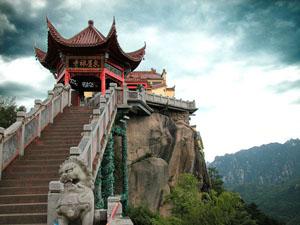Huangshan Mountain Tour
-- Tour to Mt. Jiuhua
Bordered on the Yangtze River in the
north and overlooked the Mt. Huangshan
in the south, Mt. Jiuhua covers an area of 100 square kilometers
southwest of Qingyang County, Anhui Province , not far from the
picturesque Mt.Huangshan. Mt. Jiuhua boasts 99 peaks and 18 scenic
spots in its area. With its marvelous landscape and pleasant
climate, Mt. Jiuhua is considered one of the best summer resorts in
China. In addition to its popularity as a tourist destination, it is
a holy site where Buddhists assemble-- it has been established as
one of the four sacred Buddhist shrines, along with Mt.Wutai in
Shanxi, Mt.Emei in Sichuan, and Mt.Putuoshan in Zhejiang.
According to historical records, Buddhism was first
introduced to Mt. Jiuhua in the year 401. In 719, a Korean monk
named Jin Qiaojue arrived and practiced Buddhism here for 75 years.
Upon his Nirvana in 794, Jin Qiaojue was respected as the Earth
Buddha by the locals, hence Mt. Jiuhua has become the place where
religious rituals were held to worship the God of Earth.
Mt. Jiuhua has always been a place that attracts men of
letters throughout the ages. The story goes that Libai(701-762), the
famous poet of Tang Dynasty, once came to visit the mountain. The
verse slipped out when he was intoxicated with the scene of lotus
blooms-like peaks of Mt. Jiuhua, 'From the azure skies above
descends a jade-like flow, and nine fascinating lotuses rise out of
the hills below'. Later, poet Liu Yuxi (772-784) in Tang Dynasty,
litterateur Wang Anshi (1021-1086) in North Song Dynasty and many
other scholars, politicians and monks also made the journey to the
mountain, and thus Mt. Jiuhua got its fame. Just as a Chinese saying
goes 'A mountain is famous not for its height but for its holiness'.
Visitors to the temples on Mt. Jiuhua are always
impressed with the exquisite architecture and grand structure. Now
there are no more than 90 temples in existence in Mt. Jiuhua, most
of them restored in Ming and Qing Dynasties. Among the most well
known are the Incarnation Hall, Huacheng Temple, Zhiyuan Temple,
Longevity Hall, Zhantanlin Temple, Ganlu Temple and Tiantai Zhending
Temple.
Huacheng Temple is the oldest and holiest temple on the
mountain. It is located in the center of Jiuhua Street. Though it
first appears simple and solemn, the structure and decoration of the
building are truly artistic. The engravings on lintels, brackets and
roofs reinforce the brightness and liveliness of the building. The
picture, 'Nine Dragons Playing with Pearls' on a panel in the Main
Shrine Hall is a consummate piece of ancient Chinese art.
Precious sutras and other cultural relics in the
temples are displayed in the Historical Relics Museum of the Jiuhua
Mountain. The most valuable are the Buddhist canonical literature
left from the Tang Dynasty, the Tripitaka left from the Ming
Dynasty, and Emperor Kang Xi and Emperor Qian Long's handwritings
left from the Qing Dynasty.
It is also worth mentioning the Corporeal Body Hall
houses the skeleton of Monk Wu Xia that has been well preserved for
more than 350 years. Wu Xia once wrote sutras with a mixture of gold
powder and his own blood in a cave of Mt. Jiuhua during Ming
Dynasty. After hard practice of sutras for a hundred year in Mt.
Jiuhua, Wu Xia passed away at the age of 126-- his body found in the
cave three years after his death. Monks on the mountain believed Wu
Xia was the reincarnation of Rinpoche. From then on, Buddhist
believers have been keen to visit the mountain to pay homage to the
monk.
You can include this tour with your
Huangshan tour.
|

